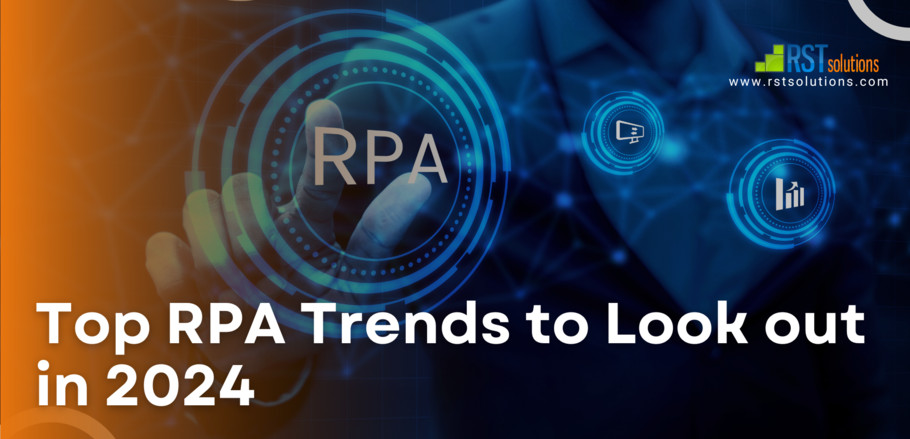
Definition: Robotic Process Automation (RPA) is a subset of AI that enables the configuration of software “robots” to automate routine tasks by capturing data and following structured inputs and business logic.
Implementation and Cost: RPA bots are easy to implement and cost-effective as they do not require deep systems integration or custom software.
Robotic process automation (RPA) has been weighed and measured, and we know what the future holds for our task-automating friend in 2024.
RPA falls under the umbrella of intelligent automation (IA), which also includes business process management (BPM), artificial intelligence (AI), and machine learning (ML). So, does standalone RPA still live up to its hype? Has enterprise-wide automation completely consumed it, or is generative AI finally pushing it to the curb?
RPA is now in use in many organizations, but what else can it do than automate monotonous tasks? It’s only getting started. More firms will take the plunge into automation and explore new business opportunities. As we enter the new year, many firms will prioritize lowering costs, improving customer service, and enhancing security, governance, and compliance in accordance with expanding environmental, social, and governance (ESG) standards.
As you are aware, generative AI is inextricably linked to RPA. As new technical improvements emerge from generation AI, RPA will grow to produce even greater efficiency and production.
We’ve narrowed our 2024 predictions down to 7 RPA trends involving:
Due to their efficiency and cost-effectiveness, RPA will continue to be a critical part of business processes.
According to the report, Robotic Process Automation Market Growth & Trends by Grand View Research, the global RPA market size is anticipated to reach USD 30.85 billion by 2030.
Gartner’s Competitive Landscape: Business Process Automation report adds, “By 2025, 70% of enterprises in all industries will have engaged digital business model transformation services to implement analytics-driven business decisions and management capabilities.”
Business Process Automation can help streamline operations by reducing human errors and resource costs. It allows faster and more accurate processing of data. It can interpret transaction-processing applications faster, and as a business tool, communicate effectively with other digital systems.
Any industry with large and complex processes is a natural fit for RPA to reduce overall costs. They allow more dependability in operations.
Enterprises are increasingly seeking seamless integrations, propelling RPA beyond its role as a standalone robotic process tool to an integrated solution alongside machine learning (ML) and artificial intelligence (AI).
In the coming years, RPA will undergo further evolution, extending its reach to facilitate processes for broader enterprise utilization. By incorporating natural language processing (NLP), the need for human intervention will diminish, thereby enhancing the efficiency of the standalone RPA platform.
A likely trend will be the emergence of an end-to-end process management platform. As this unfolds, human resources will gradually become less integral to routine activities, allowing them to shift their focus towards strategic planning and plan implementation.
An additional factor propelling this evolution is the widespread adoption of low-code and no-code solutions. This shift ensures that technical expertise is no longer a prerequisite for operating RPA platforms.
Non-technical business teams can harness its capabilities for their operations and processes. By 2024, nearly half of RPA adoptions will originate from departments outside of the IT realm. As its benefits drive business profitability, RPA will transition from being an IT-centric technology to a business technology.
With this expanded user base, RPA may consolidate into a unified platform alongside BPM and intelligent document management platforms.
The overarching expectation is that RPA will transform into an end-to-end platform for optimizing business processes, including industry marketing outreach, in the next year.
AI offers promising capabilities to businesses today. IPA represents the fusion of RPA’s rules-based automation with AI’s cognitive insights, heralding a new era in Intelligent Process Automation.
IPA harnesses machine learning and fundamental process redesign, enabling continual learning and improvement over time.
With the anticipated surge in RPA adoption in the years ahead, the market for intelligent process automation is poised for significant growth.
The growing significance of GenAI across various industry sectors will further bolster RPA. GenAI’s capacity to offer actionable insights will merge seamlessly with RPA’s efficiency in process delivery, amplifying the benefits RPA brings to businesses. Consequently, GenAI will equip RPA with orchestration capabilities, enabling intelligent automation of all processes it handles.
Enterprises are fast realizing that automation could be the key to a sustainable business organization. RPA will play a key role in achieving the ESG and sustainability goals going forward.
On the face of it, automation enables them to optimize costs across the business, creating more opportunities for standardization with a view to sustainability. RPA enables optimized processes, reducing waste and optimizing utilization of natural resources. Deploying robotic automation will also save energy by cutting back on its usage in physical units.
At RST Solutions, we’re not just about solutions; we’re about transforming your business. As experts in RPA, ERP, Business Process Automation, and Supply Chain Management, we specialize in providing consultation, implementation, and support tailored to your unique needs.
Why Choose RST Solutions?
Let’s align your technology roadmap with your business goals. Connect with RST Solutions for a 360-degree transformation – because your success is our priority.
Email id: info@rstsolutions.com
Phone no: 1-610-232-0036
#RSTSolutions #DigitalTransformation #BusinessSolutions #ConnectWithUs